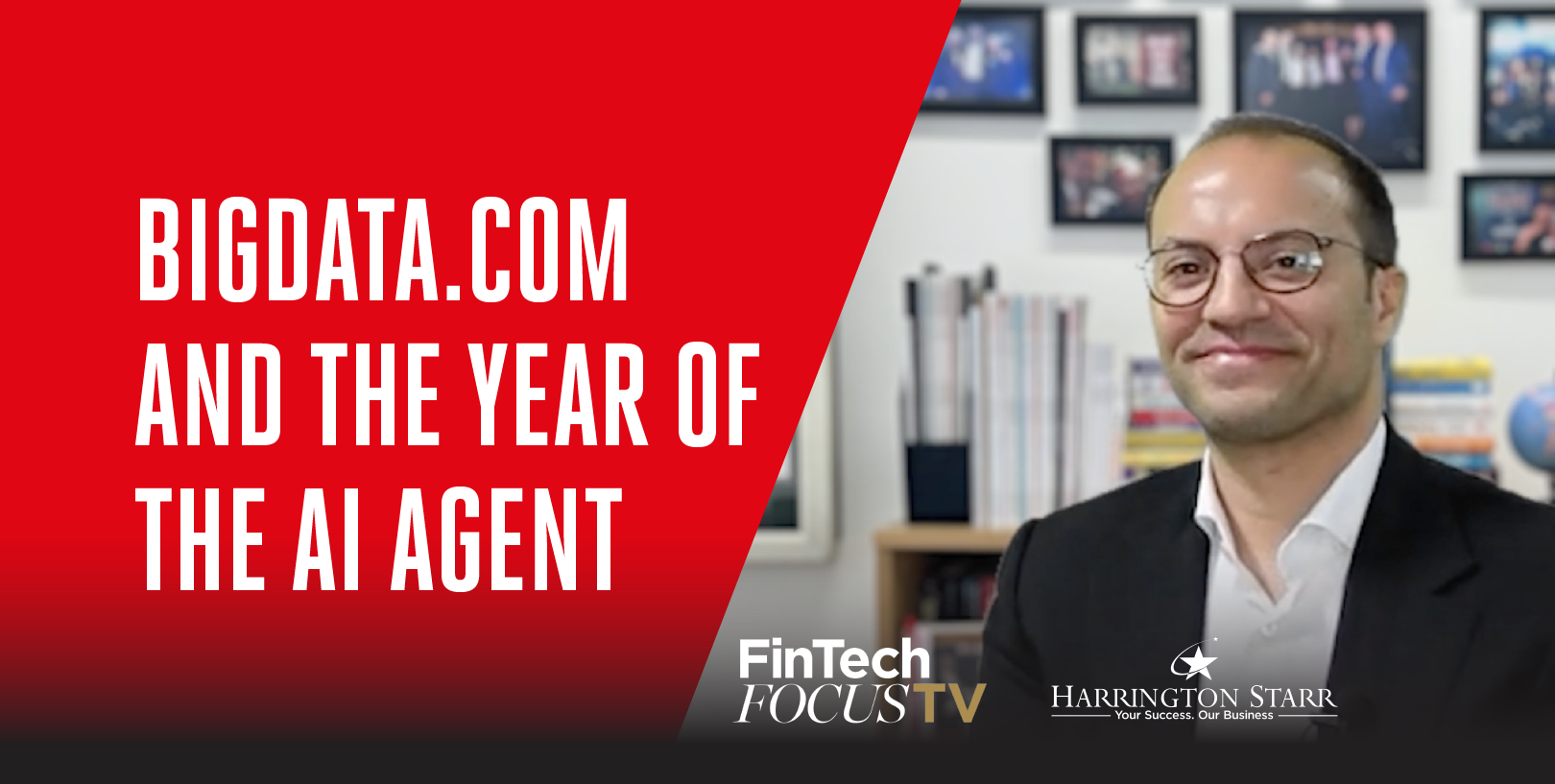
The Role of Data Science in FinTech
The latest episode of FinTech Focus TV sees Toby sit down with Peter Hafez, Chief Data Scientist at RavenPack, discussing the role of data science, AI, and NLP (Natural Language Processing) in shaping financial markets. With RavenPack at the forefront of news analytics and alternative data solutions, Peter offers insights into how technology is redefining quantitative finance, investment strategies, and decision-making processes for financial institutions. The discussion delves into the transformative impact of big data, artificial intelligence, and cloud-based infrastructures, uncovering how these innovations are streamlining financial operations and creating new opportunities for data-driven investment strategies. The ability to extract actionable insights from complex financial datasets is becoming an essential capability, and businesses are investing in cutting-edge AI models to stay ahead in an increasingly competitive market.
How Data Science is Reshaping the Financial Landscape
Peter Hafez, a recognised leader in alternative data and quantitative analytics, has spent years developing models that help financial institutions extract valuable insights from vast amounts of unstructured data. During his conversation with Toby, he delves into the ways in which hedge funds, asset managers, and trading firms leverage big data to optimise decision-making. The FinTech sector has progressed far beyond traditional financial metrics, now incorporating machine learning and artificial intelligence to improve trading strategies and risk assessment.
The discussion also explores the historical evolution of data science in finance. Hafez outlines how the past decade has seen a dramatic acceleration in data-driven insights, fundamentally altering the way financial firms operate. Previously, analysts relied on static financial reports and intuition, but today, AI-powered predictive analytics allow firms to anticipate market movements with unprecedented accuracy. The reduction of human bias in investment decision-making has become a key benefit of these advancements, ensuring that data-backed strategies replace speculative guesswork.
FinTech Recruitment and the Rise of Data Science
The world of FinTech recruitment is evolving rapidly, driven by the need for professionals who can navigate the vast landscape of data science, machine learning, and AI-driven analytics. As Peter shares, his journey into data science began with a background in economics and finance, working with major financial institutions like Credit Suisse and Saxo Bank. His transition into RavenPack 16 years ago came at a time when quantitative finance was beginning to embrace natural language processing (NLP), a technology that has now become fundamental in financial decision-making. The recruitment landscape is shifting to favour those with deep expertise in AI-driven analytics, making it essential for candidates to enhance their skill sets in areas such as big data processing, predictive analytics, and NLP applications. The demand for specialists with strong programming skills in Python, R, and SQL is also rising, particularly in firms that rely on data-driven decision-making.
With FinTech businesses increasingly looking for data-driven insights, the demand for data scientists, quantitative analysts, and AI engineers has surged. Companies like RavenPack rely on specialists who can leverage alternative data sources, develop predictive analytics models, and optimise investment strategies. As FinTech firms continue expanding, the need for professionals who can bridge the gap between data and investment decision-making is greater than ever. Peter also emphasises how financial firms are now focusing on hiring individuals with experience in building large-scale AI infrastructure, reflecting the growing integration of technology within the financial sector.
The increasing reliance on AI is transforming FinTech recruitment, with many firms seeking professionals skilled in AI ethics, explainable AI, and bias detection. The ability to interpret and validate machine learning models is becoming just as important as building them, particularly in regulated industries where transparency and accountability are paramount.
The Rise of Alternative Data in FinTech
A significant takeaway from the discussion is the rise of alternative data—a broad term that includes news sentiment analysis, social media trends, satellite imagery, and geolocation data. Hafez explains that these non-traditional data sources give financial firms a major competitive advantage by revealing market insights that standard financial reports may fail to capture. In an industry where real-time decision-making is crucial, firms that effectively integrate alternative data into their analytics platforms stand to gain a significant market edge.
The conversation also touches on the role of natural language processing (NLP) in analysing alternative data. NLP technology enables firms to process enormous volumes of text-based data in real time, helping them detect market sentiment shifts and uncover emerging trends. Regulatory changes, economic shifts, and even viral social media discussions can influence financial markets, and by incorporating NLP-driven analytics, financial institutions can react to these developments faster than their competitors.
Leveraging AI and Machine Learning in Financial Services
Hafez stresses that machine learning algorithms are reshaping how FinTech firms analyse and interpret vast datasets. By training AI models on historical financial data, institutions can detect patterns, predict market fluctuations, and automate trading strategies. However, he also highlights several key challenges, including data bias, model interpretability, and regulatory compliance, which must be tackled to ensure that AI-driven financial systems remain transparent and ethical.
The conversation further examines how machine learning models dynamically adapt over time. Unlike traditional financial models, which require frequent manual adjustments, AI-powered systems continuously refine themselves based on real-time data inputs, improving accuracy over time. This adaptability makes machine learning a vital tool in volatile market environments, where static models can struggle to keep up with rapid changes.
The Importance of Real-Time Data in Trading and Investment
Modern financial markets demand speed and precision, making real-time data analytics essential for trading strategies. Hafez explains how real-time analytics platforms are now a crucial part of trading desks, enabling traders to make instant, data-backed decisions on market movements. The shift towards high-frequency, data-driven trading strategies is revolutionising risk management, portfolio diversification, and trade execution within FinTech.
The discussion also highlights the crucial role of cloud computing and distributed data processing in enabling real-time analytics. By leveraging cloud-based technologies, firms can handle and analyse large volumes of data without infrastructure limitations, allowing them to react rapidly to market trends. Hafez further explores the development of market microstructure analysis, a method by which firms examine trading behaviours and order book dynamics to optimise trade execution.
The Future of Data Science in FinTech
Looking ahead, Hafez envisions a future where FinTech and data science will continue to evolve, driven by innovations in NLP, quantum computing, and decentralised finance (DeFi). He predicts that firms prioritising data-driven decision-making and AI-powered analytics will outperform competitors in an increasingly competitive market.
One of the most exciting developments discussed is the integration of blockchain technology and data analytics. Hafez explains that distributed ledger technology (DLT) enhances transparency and security in financial transactions, while smart contracts can automate compliance, reduce costs, and improve efficiency. As regulatory frameworks become more accommodating towards blockchain-based solutions, financial institutions are expected to embrace this technology for enhanced security and streamlined compliance.
What This Means for FinTech Recruitment
As FinTech firms continue integrating big data, AI, and real-time analytics, the demand for specialised talent in quantitative finance, data science, and algorithmic trading is rapidly growing. Companies are actively searching for data scientists, AI engineers, and quantitative analysts who can develop cutting-edge machine learning models to enhance financial decision-making. Harrington Starr, as a leading FinTech recruitment agency, plays a key role in connecting top-tier talent with firms at the forefront of innovation.
Additionally, the rise of AI-driven finance is expanding career opportunities for professionals in deep learning, data engineering, and cybersecurity. As firms grapple with regulatory compliance and the governance of AI-powered systems, individuals who possess both technical expertise and financial market knowledge are in high demand. FinTech recruitment strategies must now focus on candidates with the ability to bridge technology and financial insights.
Final Thoughts: A Data-Driven Future for FinTech
The insights shared by Peter Hafez underscore the critical role of data science in shaping the FinTech landscape. From alternative data and AI-powered analytics to real-time trading and risk management, financial firms are undergoing a data-driven transformation. As the sector continues to evolve, those who invest in innovative data strategies will lead the way in the FinTech revolution.
For professionals looking to stay ahead of the latest trends in FinTech, quantitative finance, and data-driven decision-making, subscribing to FinTech Focus TV provides valuable insights from industry leaders like Peter Hafez.
With FinTech recruitment playing an essential role in ensuring that businesses attract top-tier data science talent, firms that embrace data-first strategies will position themselves as industry leaders. As investment strategies increasingly depend on AI-powered insights, the ability to derive actionable intelligence from vast datasets will define the future leaders of financial technology.
The latest episode of FinTech Focus TV, featuring Peter Hafez, Chief Data Scientist at RavenPack, dives into the evolving landscape of data science, alternative data, and AI-driven decision-making in financial services. Hosted by Toby Babb, the discussion offers invaluable insights into the growing role of data analytics in trading, risk management, and investment strategies, showcasing how FinTech firms must adapt to the rapid integration of AI, machine learning, and real-time data processing.
A major theme of the conversation is how financial institutions increasingly leverage alternative data—such as news sentiment analysis, social media trends, and geolocation data—to enhance trading strategies and portfolio management. With the rise of natural language processing (NLP) and AI-powered analytics, firms can now extract real-time insights from unstructured data sources, gaining a crucial competitive edge in today’s volatile markets.
Hafez also highlights the importance of machine learning models that continuously refine and improve themselves based on new data inputs. Unlike traditional financial models that require manual updates, these AI-driven systems dynamically adjust to market changes, allowing firms to make quicker, more informed trading decisions. However, he acknowledges the challenges associated with AI in finance, particularly data bias, regulatory compliance, and model transparency. Ensuring that machine learning models remain ethical and interpretable is critical for their long-term success.
Another key discussion point is the growing reliance on real-time data analytics in trading. In high-frequency markets, fractions of a second can determine profitability, making real-time decision-making essential for hedge funds, asset managers, and trading firms. The integration of cloud computing, distributed processing, and blockchain technology is reshaping risk management, compliance, and financial operations.
Looking forward, Hafez predicts that the convergence of AI, quantum computing, and decentralised finance (DeFi) will shape the next generation of financial services. As financial institutions prioritise data-driven decision-making, those that invest in AI-powered analytics and big data infrastructure will gain a significant competitive advantage.
How This Episode Relates to Harrington Starr
For Harrington Starr, a leading FinTech recruitment company, this episode underscores the critical role of talent acquisition in an increasingly data-driven industry. As financial firms invest heavily in AI, quantitative analytics, and machine learning, the demand for highly skilled professionals in these fields is skyrocketing. Companies are actively seeking experts in data science, quantitative finance, AI engineering, and algorithmic trading to help them stay ahead of market trends and develop cutting-edge financial models.
Harrington Starr plays a pivotal role in connecting top-tier talent with the most innovative firms in FinTech. The insights shared by Hafez highlight the evolving skill sets required in today’s market, from expertise in alternative data and real-time analytics to proficiency in AI model development and compliance frameworks. As firms look to enhance their trading strategies with data-driven insights, the ability to recruit and retain skilled professionals is becoming a key determinant of success.
Additionally, the rapid adoption of AI and blockchain technology in financial services presents new hiring challenges and opportunities. Firms require specialised FinTech talent that understands not just data science and programming, but also the intricacies of financial markets, trading algorithms, and risk management. With a strong global network and deep industry expertise, Harrington Starr is well-positioned to help firms navigate this evolving landscape by identifying the right candidates who can drive innovation and growth.
As the FinTech sector continues to evolve, the need for recruitment strategies that prioritise technical expertise and financial knowledge will become even more critical. This podcast episode reinforces Harrington Starr’s mission—to bridge the gap between top talent and the world’s leading financial technology firms, ensuring that businesses have the specialist skills needed to thrive in a competitive, data-driven environment.





